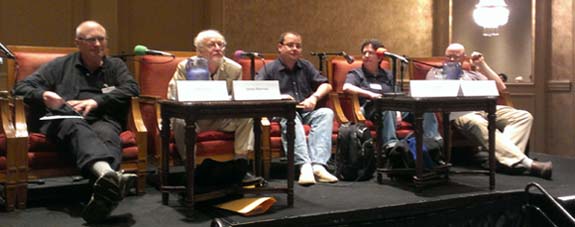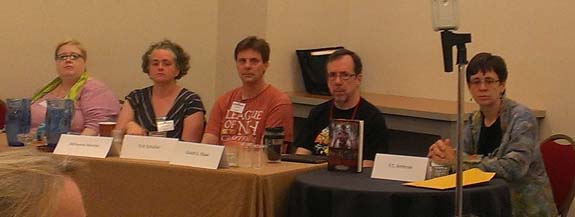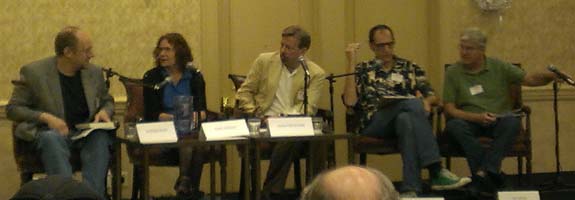We got in late yesterday for Readercon 22 — too late to setup in the Book Shop and too tired to attend any of the Thursday evening events. Instead we got our luggage and personal items out of the car, checked in to the hotel and crashed.
Friday morning. The hotel has a Starbucks in the lobby, so getting something for breakfast was simple. Then shower and look over my notes for my first panel at noon. Then at 10 a.m. we got our registration material and began to unpack the car to set up our table in the Book Shop (usually called the Dealers’ Room in most conventions except Readercon only has books sellers in the room no jewelry or other fannish items — it is a convention for readers).
A bit before noon, I stopped into the Green Room to check if the other panelists were available — no luck on that one.
12:00 PM And They Lived Happily Ever After, Until they Died: Retelling Russian Folktales.
Panelist: Patricia McKillip, Gayle Surrette (leader).
Description: Ekaterina Sedia’s The Secret Histories of Moscow, Catherynne M. Valente’s http://www.amazon.com/o/ASIN/0765326302/ampedesistud-20/” target=”_blank”>Deathless, Patricia McKillip’s In the Forests of Serre… it appears we’re in the middle of a renewed interest in fairy tale retellings–and specifically, postmodern, genre-challenging fairy tale retellings–based in the folklore of Russia. Is there a specific element to Russian stories that makes them particularly fit for contemporary adaption?
Originally there were going to be other people on the panel but they dropped out. Patricia McKillip had written two books using elements of Russian folktales. I’d hoped to moderate a panel and ask questions about the subject matter that I thought would give a chance for the authors to discuss their works and how they used the tales — which Patricia did, talking about her view of Baba Yaga and Koschei the Deathless that was very interesting. However, I’d only crammed for three days on the tales and, faced with just me and Patricia on the panel, most of that knowledge fell out my ears.
Luckily, two young women in the front row of the audience were Russian and willing to add their experience with the culture and stories. About half the audience had read The Secret History of Moscow and half had read Deathless with some overlap of the two groups. Opening the topic up to the audience for comments and questions produced an interesting discussion of the differences between Western fairy tales and folk tales (Grimm and Anderson) and Russian folk and fairy tales. The discussion ranged from how folk tales were a way to teach young children how to behave in the world and what to expect, to how the differences between and strict top down governmental structure (Tzar or Communism) and a more general representational government could change expectations of what behavior would increase your chance of survival. Is seems many Russian folk tales are about endurance while western ones are about moving up socially or becoming a success/gaining treasure.
It’s always hard to judge how a panel I’m on goes, but I feel that this one actually worked better because of the audience participation and the sharing of knowledge that occurred. I know that I learned a lot that will have me thinking in new ways as I read through the many Russian fairy/folk tales that I found on Project Gutenberg.
After the panel, I rejoined Hyperion at the SFRevu table in the Book Shop to help finish the setup. The Book Shop opened today at 3:00 PM and closed at 7:00 PM.
3:00 PM Global Climatology for Worldbuilders. Lecture by Gwendolyn Clare.
Description: The major patterns of global climate here on Earth–including atmospheric and ocean currents–can be directly derived from basic physics principles. These patterns, along with the location and shape of continents, let us predict the types of ecosystems found anywhere on the globe. After the talk, we’ll brainstorm different ways to alter the global climate system to suit our fictional needs.
I go to the science for writers programs as much as I can, and a good 80% of time, they’re pretty much worthless to me. This one was quite solidly in the 20% of goldmine territory.
Ms. Clare started off the discussion by asking the audience what things they thought most strongly influenced the climate. Several answers were offered up, but as one might expect, the biggest factor is simply the sun. There are dozens of other factors that modify and complicate climate, but the sun is the alpha point that starts the whole thing. Without an energy source, there’s no climate worth speaking of.
With just a couple of simple slides, I now actually understand what causes tropical rainforests zones, the desert bands, not to mention the coriolis affect, and why it bends the way it does where it does. There are times when information, which has been fuzzy and vague for a long time, suddenly clicks into clarity like finally getting a proper pair of glasses. This was one of those times.
More slides clearly showed sample causes for major warming and cooling periods over the last hundred million years or so, ranging from volcanoes, and particularly effective carbon dioxide eating planet, and the random actions of plate tetonics.
The last part of the talk centered around the audience calling out modifications to planets (rings, size, different stars, rotation speeds, different proportions of water to land, lack of plate tectonics, and my own very minor offering of blasting open the isthmus of Panama to rework some of the Atlantic currents) and what kind of modifications to climate these changes would inflict.
Lots to think about, and lots of new things to do more research on.
5:00 PM Feeling Very Post-Slipstream.
Panelists: Leah Bobet, Paul Di Filippo, Elizabeth Hand, Chris N. Brown (leader), F. Brett Cox.
Discription: Bruce Sterling’s definition of “slipstream” was based in the experience of living in the (late) 20th century. Now we’re in the (early) 21st, and present/near-future-set works like Mira Grant’s Feed and William Gibson’s Pattern Recognition are starting to evoke a distinctly 21st-century sensibility with frank discussions of fear, anger, religion, security, and ever-present cameras. The only terms we have for these books right now is “post-911”. We can do better. What do we call books that leave you feeling angry, scared, and angry about being scared?
I was a bit late for the panel and when I got there Elizabeth Hand was saying that she didn’t like labels; that (and I’m really paraphrasing here) they tended to keep people out or putting up as many barriers as they were supposed to help by putting things in boxes. When she reviewed for the science fiction magazines, she could use terms that when she wrote for the popular press she needed to explain those same terms.
The discussion continued and it was fairly agreed that some terms gained traction and some didn’t. Some that gained traction were: Slipstream, Cyberpunk, and now Steampunk. Steampunk is also a fashion and culture so it’s more than a literary subgenre.
Someone said that slipstream sort of pulls the rug out from under the readers expectations. Another panelist asked what would you call the post-slipstream writing if the rug is already pulled out from under the reader.
Also mentioned that slipstream was about the feeling of strangeness when reading the story. Similar to horror, it’s the feeling you get when reading it that determines its place or label.
Discussion turned to a narrative and the failure of the narrative. For many, especially young college age students, Bin Laden is the only bad guy they know about. In movies and books, when a bad thing happens it’s solved in a month. It took ten years to find Bin Laden for 9/11. In disaster films, the disaster happens and everything is worked out and solved within the movie (or book) in a relatively short period of time. Then there’s Katrina and here we are years later and the area still hasn’t recovered fully and we’ve had even more disasters (tornado, floods, drought, etc.). The narrative has failed to match the reality.
At this point, Elizabeth Hand piped up with, “What would you call that, Failstream?” The audience and the other panelists liked the term and congratulated her for coining it. She tried to say she was joking but they insisted she own the term. Once the panel opened up for comments and discussion with the audience — failstream was used for the first time. (Guess she’s stuck with coining a new term when she doesn’t care for labels — too bad the term is so apt).
Then it was back to help Hyperion in the Book Shop until closing. Then the inevitable search for food (note breakfast muffin and coffee and only water until 7 PM when we ate) and now writing up the day and off to bed and to face Saturday when I have a 7 PM panel on The One Right Form of a Story.
If you’re reading this and you were at the Russian Fairy Tale panel, I’d love to hear your impressions and comments. If you just have comments and weren’t at the panel or even Readercon — leave a comment.



